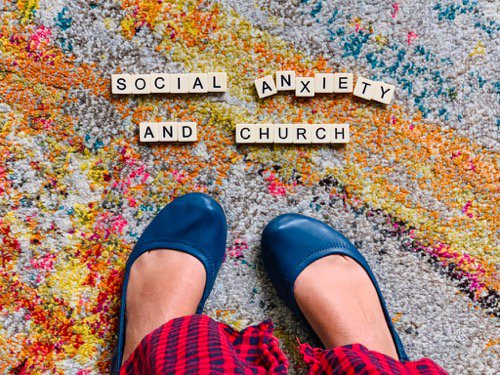Church is supposed to feel safe for everyone. But it doesn’t feel that way for so many. Not for me. Not for my son. Not for the many people I have interviewed on the topic of social anxiety and church.
Those who experience anxiety at church are often the ones who show up the first few times after they move into a new area, but then stop coming regularly, or who hardly ever go to church activities. Sometimes they come the first hour of church, but then slip out at the end of the meeting hoping no one will notice. Sometimes they are those you would never guess, but still go home exhausted, like me.
It wasn’t until my son, age 13, started to really resist church and church activities that I started seeking better understanding of anxiety and looking for ways to help those with anxiety feel comfortable at church. I know how I personally deal with my anxiety, but I wondered how different it might be for others.
It has been eye-opening to read the individual experiences and perspectives of those who have allowed me to interview them via email. Many of the interviewees, from age 9 to 60, have struggled for years, several struggling since their teen years, some since childhood, and others after experiencing a move to a new neighborhood, a divorce, or even PTSD from military service.
What has been heartbreaking to me about these interviews have been the private inner thoughts of those who struggle and what they think others might think of them and even what they think of themselves.
The fear of being looked upon as anti-social, dumb because they don’t know the answer or freeze up, judged because they can’t keep their kids still, or lazy/flakey because they don’t want to accept callings or do a poor job at them, cause many of them leave church early, attend infrequently or stop coming altogether.
Andi, age 29, shared her thoughts with me.
“It starts on Saturdays now. It’s like a constant anxiety attack for 30 hours. Usually it starts if one of my kids asks about church, or mentions that tomorrow is Sunday. And I just panic.
“Preparing for church is one of the most stressful activities I’ve experienced. In recent years, I just haven’t been able to handle it. I feel tremendous guilt for that. My kids LOVE church, and I don’t let them go, because of my mental health. Every weekend I am plagued by my failure as a mother.
“Sometimes I’ll have a good … ministering sister … and she will text me to make sure I’m OK. I’m friendly. But they all think of me as inactive. My heart doesn’t feel inactive. My faith is very active. I have a great love of the gospel. But nobody knows that because I don’t go to church.”
Freddie, age 9, doesn’t keep his anxiety at church a secret. If he starts to panic he just goes to a quiet room to calm down. But like many of those who struggle he isn’t anxious in all situations.
“Sometimes I'm OK at school. … In science (class) I can stand up in front of the class and help, and at recess I help organize games.”
The more interviews I read, the more I wish I could perfectly tailor each individual experience at church to meet their needs, magnify their strengths and help them feel safe, but that isn’t something one person can do. But a good friend at church can help in a big way, along with these suggestions made by those who were asked, “What do you feel is the most helpful way others can be a support to you at church and activities?”
• Don’t ask someone to move up if they are sitting in the back, this might be where they feel most comfortable and safe.
• Don’t call on someone if their hand isn’t raised.
• Ask ahead of time if you want someone to participate in class, being sensitive to participation that requires them to stand up or be in the front of the class.
• Be sensitive to those who are sitting alone. Some need a friend and some like to sit alone.
• When organizing activities try to include opportunities for one-on-one interactions.
• Don’t judge or assume why someone has stopped coming.
• Church and social activities may not be the best time to get to know those with anxiety. Make the effort to get to know them outside of social settings so that they will know they have a friend when they do come.
The more I have learned about social anxiety and church, the more I have been able to help my son navigate and understand his anxiety. My hope is that it will help others too!
Wendy Santiano is a writer, thinker, creator, believer and mother to six children. People are her passion — the stories they tell, the things they create and their limitless potential. Visit wendysantiano.com for more information about her ongoing social anxiety and church interviews.

